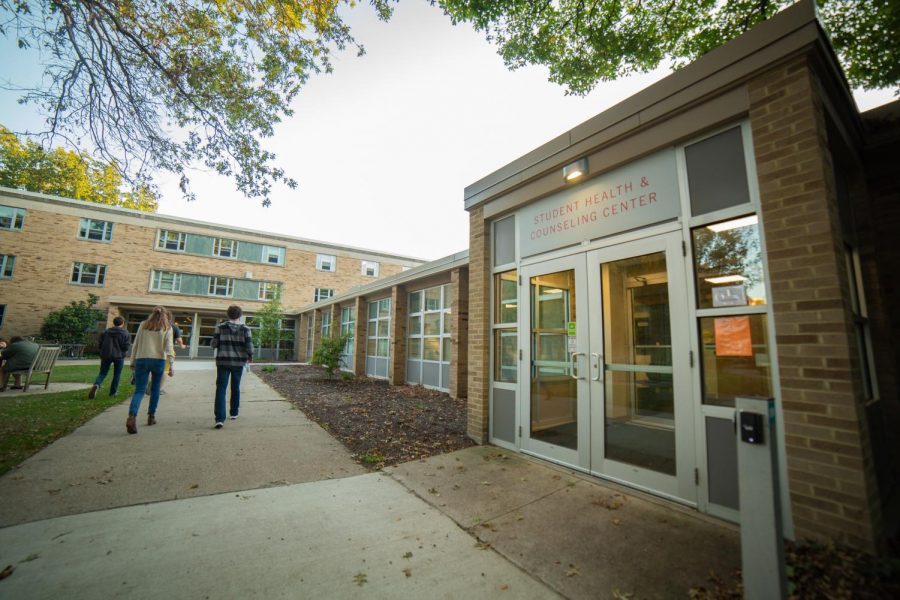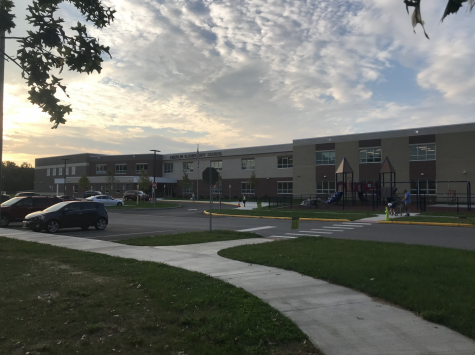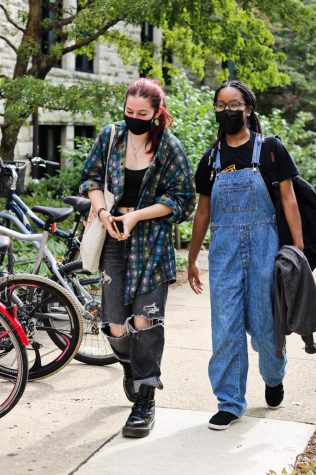Mental Health Resources Complicated by COVID
Students walk past Student Health and Counseling Center. All Counseling Center appointments are taking place over Zoom as a COVID-19 precaution.
Editor’s note: This article contains mentions of mental illness.
Some are concerned that the stress and isolation created by COVID-19 could have broad negative effects on students’ mental health. There is a particular concern that third-years and other off-campus students have decreased access to the College’s preexisting resources. Several organizations around campus are working to mitigate this.
“I think that everyone right now is definitely worried in general, just because of the current state of this pandemic and living on campus and going to school during a pandemic — it’s something that is new territory for everyone,” said Sophia Garcia, College fourth-year and student coordinator of the Peer Support Center. “This is something that no one’s ever done before.”
Director of Student Health and Counseling Services John Harshbarger said that, before the semester began, the Counseling Center was preparing for a higher volume of students in need of mental health resources.
“What we’re seeing right now is not what I anticipated, actually,” Harshbarger said. “Maybe just because we have fewer students on campus, but our usage is a little bit down compared to other years.”
Harshbarger believes that students are likely still getting adjusted to campus life, and the Counseling Center expects to see an increase in visits in the next few weeks.
For students who are not living in Oberlin — which includes almost all College third-years, many international students, and any students who chose to study remotely — the Counseling Center cannot supply ongoing treatment like therapy or continuous psychiatric appointments. Many states’ laws do not permit providers to offer therapy across state lines. However, the Counseling Center is hopeful that it will be able to connect these students with the resources they need.
“For juniors, we can provide consultation services so that if they are looking for therapy, we can help find therapy wherever they’re in the country or in the world,” Harshbarger said. “We are not to provide them with services because they’re not registered. That’s really hard for me. We’ve worked with a number of juniors who were sophomores last year, so it’s hard not to be able to continue that care.”
The College Counseling Center offers free short-term counseling services and free appointments with a psychiatrist. Meeting with a non-College provider could create an extra financial burden for students. For off-campus students whose medication is prescribed by a College psychiatrist, Harshbarger is hopeful that the College will still be able to provide their prescriptions.
“We don’t want a student to go without medication for any long period of time, and sometimes psychiatry can be very challenging to access,” Harshbarger said. “In the same way that [our psychiatrists] bridge them over the summer, they will try to provide enough medication to get them to January.”
The Counseling Center is legally prohibited from making continuous appointments with people who reside outside of Ohio or with students who are not currently registered in classes. As a result, they will be unable to make large adjustments in the dosage of a medication, alter a patient’s prescription, prescribe medication to new patients, or prescribe controlled substances such as Adderall or Ritalin to these students.
One resource available to all students, on- or off-campus, is the Student Help and Resource Exchange. The SHARE program connects students with staff at the Dean of Students Office, who can provide support and direct students to relevant resources.
“This semester, all SHARE appointments are happening by phone or Zoom,” wrote Kourtney Arcaba, assistant dean, deputy Title IX and equity coordinator, and director of SHARE, in an email to the Review. “Any Oberlin student is welcome to schedule a meeting to connect with a SHARE Advisor — this includes remote students and students not currently enrolled. We know this is a challenging year for many reasons and want to be able to provide support, resources, and a listening ear to as many Obies as possible.”
The SHARE program is also working to mitigate any mental health problems caused or exacerbated by COVID-19 safety measures.
“We are intentionally reaching out to all students in isolation and quarantine to check in and provide support,” Arcaba wrote. “We have not done this type of ongoing outreach in the past and hope that students who need it will find it helpful during what can be a challenging time.”
Students can also submit a SHARE report for any friend or peer who they are concerned about, and the SHARE team will reach out to them. The form can be submitted anonymously.
SHARE has advisor hours from 9 a.m. to noon and from 1 p.m. to 5 p.m. on weekdays, but if a student is in crisis outside of these hours Campus Safety can be called to respond.
“What we do is we approach in a supportive manner, we identify ourselves as Campus Safety and try to assess the situation in the most caring way possible by listening,” said Director of Campus Safety Mike Martinsen. “We’re not clinicians, we’re not trained medical staff, but we do receive training for crisis situations. We are very careful to provide the support necessary to gain the information to share with the people that do have the clinical backgrounds and the therapists on campus.”
Campus Safety can also put students into contact with a mental health professional through a program called Protocol, open 24 hours a day. The professional can perform an assessment to determine whether the student needs any emergency services.
If someone calls Campus Safety with concerns about a student, and that student cannot be located, officers can use tools to help them find the student, like checking the last location they swiped their ID card.
Students can seek care through the SHARE program or Counseling Center. Students who want more informal support will eventually be able to utilize the Peer Support Center, which is working on setting up Zoom listening hours.
Any student who is currently prescribed medication from the Counseling Center and is not enrolled in school or currently on Oberlin’s campus should reach out to the Counseling Center at 440-775-8470 or counsel@oberlin.edu to ensure they have access to medication while off-campus.








